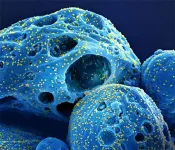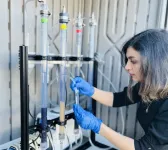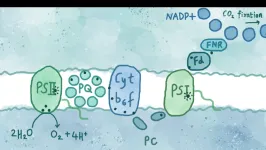(Press-News.org) The COVID-19 pandemic has killed nearly 7 million people worldwide (1.1 million in the United States) and severely harmed many millions more, though vaccines and antiviral treatments measurably reduced the potential loss of life and health.
A Commonwealth Fund report, for example, estimated COVID-19 vaccines alone prevented more than 18 million additional hospitalizations and 3.2 million additional deaths in the U.S.
The pandemic has never been simple or easy. For example, the emergence of viral variants, in particular recent versions of the Omicron, fueled new surges of infection and disease throughout 2022 and into 2023.
“There were real concerns about new waves of cases driven by BA.5, which had replaced BA.2.12.1 as the dominant strain in the United States,” said Aaron Carlin, MD, PhD, associate professor of pathology at University of California San Diego School of Medicine. “It looks like past infection by an earlier subvariant would not elicit cross-protection against the new BA.4 and BA.5 subvariants.”
In a new study, published in the March 21, 2023 online issue of Open Forum Infectious Disease, Carlin and colleagues at UC San Diego School of Medicine describe why COVID-19 subvariants spread rapidly among people previously infected and how the popular Paxlovid therapy might have made people more susceptible to future infections.
The researchers found that mutations in the spike protein of BA.4 and BA.5 allowed it to evade neutralizing antibodies generated by vaccination or by an earlier SARS-CoV-2 infection. Moreover, they determined that early treatment with Paxlovid, an oral antiviral pill that combines drugs (nirmatrelvir and ritonavir), dampened the natural development of antibodies, leaving people with lower overall immune responses and perhaps more vulnerable to subsequent infection.
Paxlovid was among the first drugs developed and tested to treat COVID-19, and quickly became a go-to medication, often prescribed when symptoms first appeared and intended to reduce the likelihood of severe disease, hospitalization or death. Subsequent research has shown that Paxlovid treatment among non-hospitalized, unvaccinated patients at high risk of progression to severe disease reduced the risk of hospitalization or death by 88%, and the risk of long COVID.
But Paxlovid proved poor insurance against recurrence of COVID-19 or subsequent re-infection.
In June 2022, senior author Davey Smith, MD, chief of Infectious Diseases and Global Public Health at UC San Diego School of Medicine and an infectious disease specialist at UC San Diego Health, Carlin and colleagues published data suggesting the so-called “Paxlovid rebound” was likely due to insufficient drug exposure.
In October 2022, Smith and colleagues published a different study that documented the likelihood of COVID-19 symptoms recurring in untreated patients after initial symptoms had disappeared.
"Our findings suggest that while early antiviral treatment can prevent severe COVID-19, it does not obviate the need for subsequent vaccination or boosters to promote protective immune responses,” said Smith.
“The findings also highlight the importance of ongoing research and the need for continued efforts to understand the virus and develop effective treatments and vaccines. The past is prologue, not because the virus is the same, but because it is constantly changing, so we must evolve as well to meet the threat and anticipate the next pandemic.”
Co-authors include: Alex E. Clark, Aaron F. Garretson, William Bray, Magali Porrachia, Tariq M. Rana and Antoine Chaillon, all at UC San Diego; and AsherLev T. Santos, CSU San Marcos.
# # #
END
Why subvariants of the SARS-CoV-2 virus accelerated the pandemic
UC San Diego study finds neutralizing antibody response to later virus subvariants was less robust and Paxlovid treatment left patients more susceptible to re-infection
2023-03-22
ELSE PRESS RELEASES FROM THIS DATE:
Semiconductor lattice marries electrons and magnetic moments
2023-03-22
ITHACA, N.Y. -- A model system created by stacking a pair of monolayer semiconductors is giving physicists a simpler way to study confounding quantum behavior, from heavy fermions to exotic quantum phase transitions.
The group’s paper, “Gate-Tunable Heavy Fermions in a Moiré Kondo Lattice,” published March 15 in Nature. The lead author is postdoctoral fellow Wenjin Zhao in the Kavli Institute at Cornell.
The project was led by Kin Fai Mak, professor of physics in the College of Arts and Sciences, and Jie Shan, professor of applied and engineering physics in Cornell Engineering ...
Nominations sought for 2024 Watanabe Prize in Translational Research
2023-03-22
Indiana University School of Medicine is accepting nominations until May 1 for the 2024 August M. Watanabe Prize in Translational Research.
The Watanabe Prize is one of the nation’s largest and most prestigious research awards recognizing senior investigators focused on shepherding scientific discoveries into new therapies for patients. Nominees should be members of the scientific or medical communities who have demonstrated outstanding accomplishments in translational research.
The winner will receive $100,000 and will spend Sept. 18-20, 2024, in Indianapolis as a vising dignitary, sharing insights and knowledge with audiences at IU School of Medicine and its partner institutions. ...
Dr. Ekta Khurana receives grant to study prostate cancer evolution
2023-03-22
Dr. Ekta Khurana, an associate professor of physiology and biophysics at Weill Cornell Medicine, has received a 3-year, $1.2 million grant from the United States Department of Defense to investigate how prostate cancer cells evolve to become resistant to hormone-blocking therapy. This work will contribute to further understanding prostate cancer and the development of effective targeted therapies for the disease.
Prostate cancer growth is dependent on androgens – male hormones such as testosterone – binding ...
New UBC water treatment zaps ‘forever chemicals’ for good
2023-03-22
Engineers at the University of British Columbia have developed a new water treatment that removes “forever chemicals” from drinking water safely, efficiently – and for good.
“Think Brita filter, but a thousand times better,” says UBC chemical and biological engineering professor Dr. Madjid Mohseni, who developed the technology.
Forever chemicals, formally known as PFAS (per-and polyfluoroalkyl substances) are a large group of substances that make certain products non-stick or stain-resistant. There are more than ...
Photosynthesis ‘hack’ could lead to new ways of generating renewable energy
2023-03-22
Researchers have ‘hacked’ the earliest stages of photosynthesis, the natural machine that powers the vast majority of life on Earth, and discovered new ways to extract energy from the process, a finding that could lead to new ways of generating clean fuel and renewable energy.
An international team of physicists, chemists and biologists, led by the University of Cambridge, was able to study photosynthesis – the process by which plants, algae and some bacteria convert sunlight into energy – ...
Simulated terrible drivers cut the time and cost of AV testing by a factor of one thousand
2023-03-22
Photos // Video
The push toward truly autonomous vehicles has been hindered by the cost and time associated with safety testing, but a new system developed at the University of Michigan shows that artificial intelligence can reduce the testing miles required by 99.99%.
It could kick off a paradigm shift that enables manufacturers to more quickly verify whether their autonomous vehicle technology can save lives and reduce crashes. In a simulated environment, vehicles trained by artificial intelligence perform perilous maneuvers, forcing the AV to make decisions that confront drivers only rarely on ...
Multiple substance use disorders may share inherited genetic signature
2023-03-22
A new study suggests that a common genetic signature may increase a person’s risk of developing substance use disorders, regardless of whether the addiction is to alcohol, tobacco, cannabis or opioids. The research, led by Washington University School of Medicine in St. Louis, eventually could lead to universal therapies to treat multiple substance use disorders and potentially help people diagnosed with more than one.
Published March 22 in the journal Nature Mental Health, the study’s findings are drawn from an analysis of genomic data from more than 1.1 million people of mostly European ancestry and a smaller ...
How vision begins
2023-03-22
Researchers at the Paul Scherrer Institute PSI have deciphered the molecular processes that first occur in the eye when light hits the retina. The processes – which take only a fraction of a trillionth of a second – are essential for human sight. The study has now been published in the scientific journal Nature.
It only involves a microscopic change of a protein in our retina, and this change occurs within an incredibly small time frame: it is the very first step in our light perception and ability to see. It is also the ...
New NIH study reveals shared genetic markers underlying substance use disorders
2023-03-22
By combing through genomic data of over 1 million people, scientists have identified genes commonly inherited across addiction disorders, regardless of the substance being used. This dataset – one of the largest of its kind – may help reveal new treatment targets across multiple substance use disorders, including for people diagnosed with more than one. The findings also reinforce the role of the dopamine system in addiction, by showing that the combination of genes underlying addiction disorders was also associated with regulation of dopamine signaling.
Published ...
Surprisingly simple explanation for the alien comet 'Oumuamua's weird orbit
2023-03-22
In 2017, a mysterious comet dubbed 'Oumuamua fired the imaginations of scientists and the public alike. It was the first known visitor from outside our solar system, it had no bright coma or dust tail, like most comets, and a peculiar shape — something between a cigar and a pancake — and its small size more befitted an asteroid than a comet.
But the fact that it was accelerating away from the sun in a way that astronomers could not explain perplexed scientists, leading some to suggest that it was an alien spaceship.
Now, a University of California, Berkeley, astrochemist ...
LAST 30 PRESS RELEASES:
Why conversation is more like a dance than an exchange of words
With Evo 2, AI can model and design the genetic code for all domains of life
Discovery of why only some early tumors survive could help catch and treat cancer at very earliest stages
Study reveals how gut bacteria and diet can reprogram fat to burn more energy
Mayo Clinic researchers link Parkinson's-related protein to faster Alzheimer's progression in women
Trends in metabolic and bariatric surgery use during the GLP-1 receptor agonist era
Loneliness, anxiety symptoms, depressive symptoms, and suicidal ideation in the all of us dataset
A decision-support system to personalize antidepressant treatment in major depressive disorder
Thunderstorms don’t just appear out of thin air - scientists' key finding to improve forecasting
Automated CT scan analysis could fast-track clinical assessments
New UNC Charlotte study reveals how just three molecules can launch gene-silencing condensates, organizing the epigenome and controlling stem cell differentiation
Oldest known bony fish fossils uncover early vertebrate evolution
High‑performance all‑solid‑state magnesium-air rechargeable battery enabled by metal-free nanoporous graphene
Improving data science education using interest‑matched examples and hands‑on data exercises
Sparkling water helps keep minds sharp during long esports sessions
Drone LiDAR surveys of abandoned roads reveal long-term debris supply driving debris-flow hazards
UGA Bioinformatics doctoral student selected for AIBS and SURA public policy fellowship
Gut microbiome connected with heart disease precursor
Nitrous oxide, a product of fertilizer use, may harm some soil bacteria
FAU lands $4.5M US Air Force T-1A Jayhawk flight simulator
SimTac: A physics-based simulator for vision-based tactile sensing with biomorphic structures
Preparing students to deal with ‘reality shock’ in the workplace
Researchers develop beating, 3D-printed heart model for surgical practice
Black soldier fly larvae show promise for safe organic waste removal
People with COPD commonly misuse medications
How periodontitis-linked bacteria accelerate osteoporosis-like bone loss through the gut
Understanding how cells take up and use isolated ‘powerhouses’ to restore energy function
Ten-point plan to deliver climate education unveiled by experts
Team led by UC San Diego researchers selected for prestigious global cancer prize
Study: Reported crop yield gains from breeding may be overstated
[Press-News.org] Why subvariants of the SARS-CoV-2 virus accelerated the pandemicUC San Diego study finds neutralizing antibody response to later virus subvariants was less robust and Paxlovid treatment left patients more susceptible to re-infection





